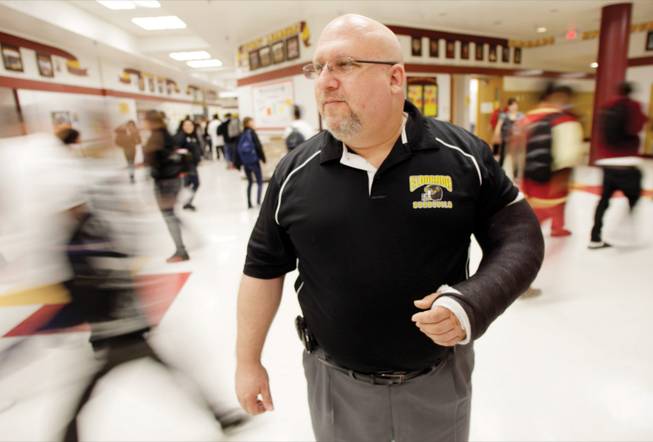
In light of economic turmoil, Principal Ron Lustig is planning a family appreciation night at Eldorado High School.
Wednesday, Dec. 2, 2009 | 2 a.m.
Sun Coverage
The Clark County School District has always struggled with its sky-high population of poor children. The number of homeless students is expected to reach 8,000 by the end of the academic year, a 30 percent increase. And a full 44 percent of the district’s students receive free or reduced-price lunches, a commonly used indicator of childhood poverty.
Family poverty, in turn, is correlated with lagging student achievement.
Now, the deep recession threatens to make this problem worse, and do so for years to come.
According to a study from two economists at the University of California, Davis, a parent’s job loss can increase by 15 percent the likelihood that a student will repeat a grade.
This short-term damage, which is particularly acute in families where the breadwinner has just a high school degree, matches up with other data showing the negative long-term effects of poverty on student achievement.
Nevada’s unemployment rate is 13 percent, which only declined last month because so many people stopped looking for work and left the labor force altogether.
If the UC-Davis study bears out, it could mean thousands of additional Clark County students repeating a grade, which is expensive for the beleaguered district and can lead to a downward spiral for the students.
Assembly Speaker Barbara Buckley, who heads Legal Aid of Southern Nevada, said the data are concerning.
“I’m not terribly surprised by that,” she said. “When there’s a job loss and an economic hit, it adds to the stress of everyone in the family.”
Many of her clients are in need of legal help to stay in their homes and apartments, while also trying to scrape enough together for the power bill and food.
Her agency is seeing more referrals for spousal and child abuse, she said — other risk factors for poor academic achievement.
Leroy Pelton, a professor at the UNLV School of Social Work, said, “There is a very strong relationship, when unemployment and poverty rates increase, that child abuse and neglect go up. The conditions that poverty leads to also lead to dangers for children.”
As Buckley noted, the problem now extends well beyond the traditional bounds of poverty. “We see so many people who have never been in this situation before. A man (came in) who said in 36 years, he’d never been without a job.”
Buckley said she believes teachers are aware of the situation and are trying to do the best they can. New poverty and how to deal with the holidays were big topics of discussion at her recent PTO meeting, she said.
Kim Boyle, director of guidance and counseling for the School District, said tracking the number of children who are held back a grade because of their parents’ job losses may be difficult. The district saw its enrollment decline this year for the first time in more than a quarter-century, losing about 2,200 students overall. It’s possible some parents who lost jobs also left town with their families, she noted, making it difficult to follow a student’s academic path.
By at least one measure, the district didn’t see a jump in retention for the 2008-09 academic year, Boyle said. Of the eighth grade students identified as being on academic probation and at risk of being kept back, 17 percent did not move on to high school, down from 20 percent in the prior academic year.
However, there is no shortage of ancillary and anecdotal evidence to suggest that the economy is having an effect on student achievement.
Noticing a drop in attendance last year, Eldorado High School Principal Ron Lustig started asking students what was keeping them from class.
The answers were troubling: Students said they were staying home to baby-sit younger siblings to save on child care costs, or so that parents could work. In some cases students were picking up extra hours at their own part-time jobs to help contribute to their family’s income.
“We tell kids education is paramount, but food and shelter have to come first,” Lustig said. “We do what we can to help meet their needs, but there are lot of families struggling out there that we don’t even know about.”
At Eldorado’s family night this month, Lustig had planned to follow the blueprint of last year’s event, including lessons in how to use the districtwide online database that provides parents with daily updates on student grades and homework.
But instead, Lustig is now planning a family appreciation night. There will be hot chocolate, donated new winter coats, a selection of unwrapped gifts for parents to share with their families and even photos with Santa for the younger siblings.
“We know people are struggling,” Lustig said. “They do what they can do to survive, and that has to affect the kids.”

Join the Discussion:
Check this out for a full explanation of our conversion to the LiveFyre commenting system and instructions on how to sign up for an account.
Full comments policy